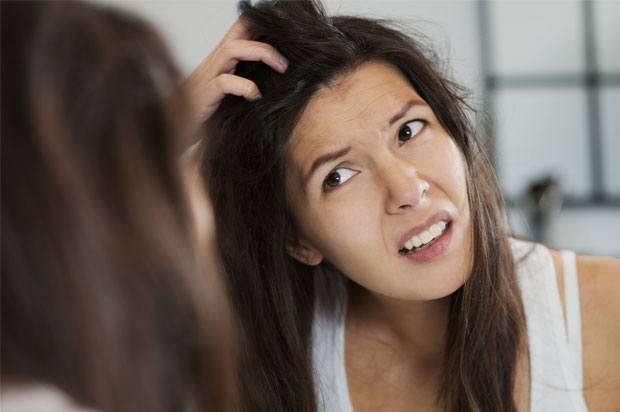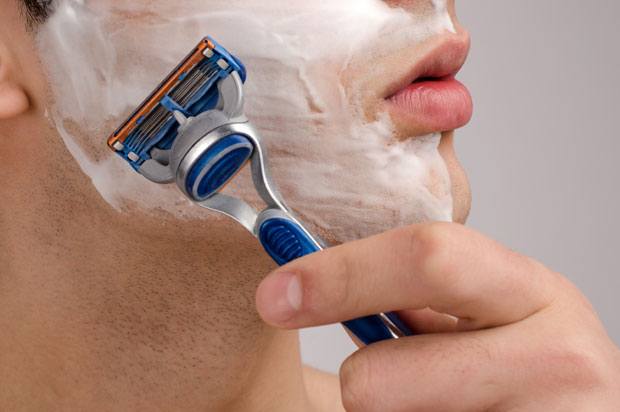Dandruff

No one wants to have white flakes on their shoulders, but how do you get dandruff in the first place, and more importantly, how do you get rid of dandruff, fast?
What is dandruff?
Dandruff is caused by a handful of different scalp and skin conditions, but those little white flakes are basically dead skin cells. Because they look flaky like dry/ashy skin, you might think it’s just a dehydrated scalp you want to avoid, but both a dry scalp or an overly oily scalp can cause excess cells to clump and fall off as dandruff flakes.
Dandruff is also believed to be caused by an overgrowth of a fungus commonly found on the skin and scalp, called Pityrosporum ovale. The condition may be worse in the winter because UVA light from the sun works against the fungus. Too much sebum, which is the natural oil that’s secreted from glands in the skin, also fuels the growth of this fungus. This may be why dandruff often starts in puberty because of all the hormone changes, or if you happen to have an oily scalp.
How do you get dandruff?
Like most skin conditions, it can be hereditary, so if one of your parents happens to have dry skin which affects the scalp, that might lead to dandruff.
Another thing you might inherit is seborrheic dermatitis, the name for eczema that affects the scalp. This skin condition is caused by an overproduction of sebum or oil from sebaceous glands around the hair follicles. Seborrheic dermatitis can be due to stress, oily skin, seasonal changes and certain medical conditions.
Ever heard of an autoimmune condition called psoriasis? Well, if you get this inflammatory skin condition on your scalp, you’ll probably experience itching along with large, white flakes. Psoriasis can be very difficult to treat, but various medical treatments, like coal tar, light therapy, and topical corticosteroid use can help manage your symptoms. Since it seems to be caused by your immune system reacting to something it doesn’t like, there’s a possibility you might be eating something that doesn’t agree with you. Flare ups are caused by different things for different people, but some of the main suspects are alcohol, junk food (sugar, etc) and gluten. Check out our guide to foods that are good for your skin here.
But if none of the above apply, why do you get dandruff? Well, surprisingly enough some of the ingredients commonly found in shampoo (even anti-dandruff shampoo), can actually cause dandruff if they’re irritating your scalp. Parabens, for example, make some people itchy and irritated, so you might want to look for products that are paraben free and see if you find any improvement.
Dandruff myths
A common myth is that you may have it because of poor hygiene, but you can tell anyone who asks you to go and wash your hair that they don’t know what they’re talking about!
It’s also a myth that using styling products causes a flaky scalp, and you definitely can’t catch it off anyone. You’re more likely to get dandruff between the ages of 20 to 30 and you’ve also got a higher chance of having it if you’re a bloke – but you can’t help that! So how do you get rid of dandruff?
Dandruff treatment – how to get rid of dandruff
If you want to prevent dandruff or improve the condition of your scalp the natural way, try to cut down on salty, sugary and spicy foods, alcohol and cigarettes, and increase your intake of vitamin B, B6, E, selenium and zinc. See our guide to getting a balanced diet here. You may also want to stay away from colouring or bleaching your hair as the chemicals could irritate your scalp.
If you need a quick fix, then try these over-the-counter remedies:
- Anti-dandruff shampoos should be used two to three times a week. Massage your scalp with the shampoo and make sure you don’t scratch it, however tempting it may be. Sometimes you may have to leave the shampoo in for a couple of minutes, but always check the label first. Remember, some shampoos can irritate your scalp, so if you’re not getting anywhere with one brand try another.
- Anti-fungal shampoos contain a chemical that works well to get rid of dandruff, but they also need to be used a few times a week and can take up to six weeks to work. Whatever shampoo you use, make sure you brush your hair gently and make sure you’ve rinsed everything off your hair before you get out of the shower.
My anti-dandruff shampoo isn’t working…
If your dandruff doesn’t shift after using special shampoos, or if it gets worse or affects other parts of your skin, it may help to go and see your doctor (GP). It could be that you need to take prescribed medication, or be referred to a skin specialist, especially if you have a more serious skin condition such as seborrhoeic eczema or seborrhoeic dermatitis. This is a more severe form of dandruff that will also affect the skin around your eyebrows, nose, ears, face and forehead. Psoriasis can also affect the scalp.
Questions or worries about your appearance? Check out the rest of The Mix’s appearance resources.
Next Steps
- Chat about this subject on our Discussion Boards.
By
Updated on 22-Sep-2022
Picture of woman scratching her head by Shutterstock.
No featured article










